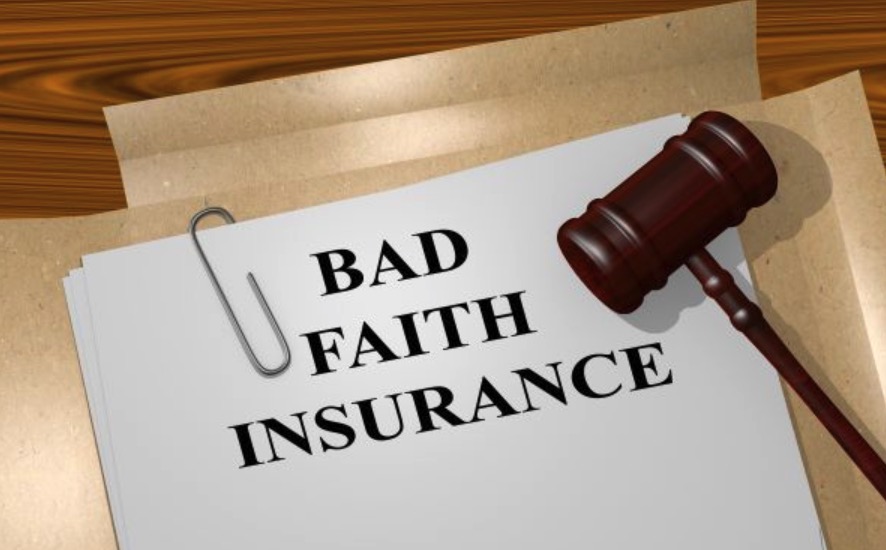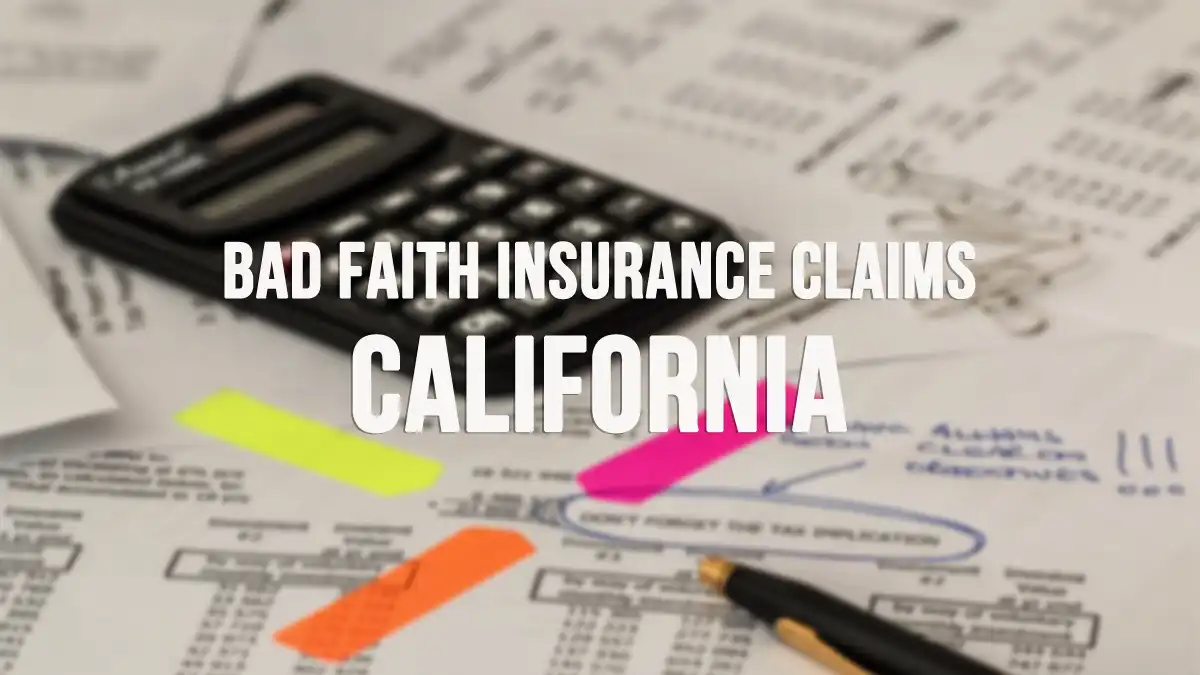Bad Faith Insurance Claims California – Hey there! If you’ve ever dealt with an insurance claim, you know it can be a headache. But what happens when your insurance company plays dirty? In California, understanding bad faith insurance claims is crucial because they can leave you feeling frustrated and financially drained[1]. This article breaks down what bad faith looks like, your rights as a policyholder, and how to fight back. Stick around—your peace of mind might just depend on it!
Understanding Bad Faith Insurance Claims California
When dealing with insurance companies, many individuals and businesses expect that their claims will be handled fairly and promptly. However, not all insurance companies act in good faith. Bad Faith Insurance Claims California In California, like in other states, insurance companies are required to operate in good faith when processing claims.
When they fail to do so, it may lead to what is termed a “bad faith insurance claim.” In this comprehensive guide, we will explore what bad faith insurance claims are, how they arise in California, and what policyholders can do when faced with such situations.
What Are Bad Faith Insurance Claims?

Insurance is a contract between the policyholder and the insurance company. The policyholder pays premiums, and in return, the insurance company agrees to provide coverage according to the terms of the policy. Bad Faith Insurance Claims California When an insurance company fails to meet its obligations under this contract, it may be acting in bad faith.
Definition of Bad Faith Insurance
Bad faith occurs when an insurance company intentionally delays, denies, or underpays a legitimate claim without a valid reason. Bad Faith Insurance Claims California In California, there are strict laws that outline what constitutes bad faith. These laws are designed to protect consumers from unfair practices by insurance companies.
Common Forms of Bad Faith
Bad faith can take many forms, including:
- Denying a claim without conducting a thorough investigation.
- Delaying payment for no reasonable cause.
- Offering less compensation than what is owed under the policy.
- Failing to communicate promptly with the policyholder.
Legal Consequences for Insurers
In California, when an insurer acts in bad faith, they may face legal consequences. Bad Faith Insurance Claims California Policyholders who can prove bad faith can sue the insurance company for damages beyond what is owed under the policy, including emotional distress and punitive damages.
Legal Framework for Bad Faith Claims in California

California has established specific laws and regulations that protect policyholders from bad faith practices by insurance companies. These laws help ensure that insurers are held accountable for their actions.
California Insurance Code Section 790.03
One of the key legal frameworks governing bad faith claims in California is the California Insurance Code Section 790.03. This section outlines the unfair practices that are prohibited for insurers. It includes:
- Misrepresentation of policy provisions.
- Failing to acknowledge or act on claims promptly.
- Attempting to settle claims for less than what is reasonable.
Implied Covenant of Good Faith and Fair Dealing
Under California law, every insurance contract contains an implied covenant of good faith and fair dealing. Bad Faith Insurance Claims California This means that both the policyholder and the insurance company must act fairly and in good faith when handling claims. When an insurance company breaches this covenant, it opens the door for a bad faith claim.
Recommendation : California Insurance Services – Your Best Essential Guide
Statute of Limitations
In California, there is a specific time limit within which policyholders must file a bad faith claim. This is known as the statute of limitations. Bad Faith Insurance Claims California Typically, this time frame is two years from the date the bad faith occurred. Missing this deadline can prevent policyholders from pursuing legal action.
Types of Insurance Claims That Can Involve Bad Faith
Bad faith can arise in various types of insurance claims. Whether you have auto insurance, homeowners insurance, or health insurance, any type of policy can be subject to bad faith practices.
Auto Insurance Bad Faith Claims
Auto insurance is one of the most common types of insurance where bad faith claims arise. Bad Faith Insurance Claims California For example, if your insurance company refuses to pay for damages after an accident, delays processing your claim, or offers an unreasonably low settlement, these actions could be considered bad faith.
Homeowners Insurance Bad Faith Claims
Homeowners insurance is another area where bad faith claims frequently occur. Bad Faith Insurance Claims California After a natural disaster, theft, or other covered events, if the insurer denies coverage or offers inadequate compensation, the policyholder may have grounds for a bad faith claim.
Health Insurance Bad Faith Claims
Health insurance companies are also required to act in good faith. When a health insurer refuses to cover medically necessary treatments or delays approving treatments, the policyholder may be able to file a bad faith claim.
Signs That Your Insurance Company May Be Acting in Bad Faith

It can sometimes be difficult to tell if your insurance company is acting in bad faith. Bad Faith Insurance Claims California However, there are several signs that may indicate unfair treatment.
Delayed Communication or Responses
If your insurance company consistently fails to respond to your inquiries or takes an unreasonable amount of time to process your claim, it could be a sign of bad faith. Insurance companies are required to communicate promptly with policyholders.
Unexplained Denials of Claims
A common sign of bad faith is when an insurance company denies your claim without a valid reason. Bad Faith Insurance Claims California They must provide a clear explanation for any denial. If they do not, this could be a red flag.
Lowball Settlements
If your insurance company offers you significantly less money than what is owed under your policy, this could be considered a lowball settlement. Insurers sometimes do this to save money, hoping that the policyholder will accept the reduced amount.
Steps to Take If You Suspect Bad Faith
If you believe that your insurance company is acting in bad faith, there are specific steps you can take to protect your rights and ensure that your claim is handled properly.
Document All Communication
It’s important to keep detailed records of all interactions with your insurance company. Bad Faith Insurance Claims California This includes saving emails, letters, and notes from phone conversations. These documents can serve as evidence if you need to file a bad faith claim.
Request a Written Explanation
If your claim is denied, request a written explanation from your insurer. Bad Faith Insurance Claims California They are legally required to provide this, and it can help you determine whether their decision was justified or made in bad faith.
Consult with an Attorney
If you believe your insurer is acting in bad faith, it may be time to consult with an attorney. An experienced attorney can review your case, help you understand your legal options, and guide you through the process of filing a bad faith claim.
How to Prove a Bad Faith Insurance Claim in California
Proving a bad faith insurance claim in California requires evidence that the insurer acted unreasonably or unfairly. Bad Faith Insurance Claims California There are several key elements that must be established.
The Validity of the Original Claim
First, you must prove that your original claim was valid and covered under the terms of your policy. This means that you met all the requirements and conditions set forth by the insurance contract.
The Insurer’s Unreasonable Conduct
Next, you need to show that the insurer’s conduct was unreasonable. Bad Faith Insurance Claims California This could include denying the claim without a proper investigation, delaying the claims process, or offering an unfairly low settlement.
Evidence of Damages
Finally, you must provide evidence that you suffered damages as a result of the insurer’s bad faith actions. This could include financial losses, emotional distress, or additional costs incurred due to the insurer’s refusal to pay your claim.
Possible Outcomes of a Bad Faith Insurance Claim
Bad Faith Insurance Claims California If you successfully prove that your insurance company acted in bad faith, there are several possible outcomes.
Compensation for Policy Benefits
The most immediate outcome is that the insurance company will be required to pay the policy benefits that were originally owed to you. Bad Faith Insurance Claims California This means that they must cover the claim according to the terms of your policy.
Emotional Distress and Punitive Damages
In addition to the policy benefits, California law allows policyholders to seek compensation for emotional distress caused by the insurer’s bad faith actions. In some cases, punitive damages may also be awarded to punish the insurer for particularly egregious conduct.
Legal Fees
Bad Faith Insurance Claims California If you win your bad faith insurance case, the insurance company may be required to pay your legal fees. This helps alleviate the financial burden of pursuing legal action.
Preventing Bad Faith Insurance Practices
While it’s not always possible to prevent bad faith practices, there are steps you can take to reduce the risk of encountering such issues with your insurance company.
Choose a Reputable Insurance Company
Bad Faith Insurance Claims California One of the best ways to avoid bad faith practices is to choose a reputable and financially stable insurance company. Research the company’s track record, read reviews, and look for any past complaints of bad faith.
Understand Your Policy
It’s crucial to thoroughly understand the terms and conditions of your insurance policy. Bad Faith Insurance Claims California This will help you know what is covered, what is excluded, and what your rights are if you need to file a claim.
Act Promptly When Filing Claims
When a loss occurs, file your insurance claim as soon as possible. Delays in filing can sometimes lead to disputes with the insurance company. The sooner you file, the sooner your claim can be processed.
Conclusion
Dealing with bad faith insurance practices can be frustrating and overwhelming. However, California’s laws are designed to protect policyholders and ensure that insurance companies act in good faith. If you suspect that your insurance company is acting in bad faith, it’s important to know your rights and take the necessary steps to protect yourself.
Bad Faith Insurance Claims California By understanding the signs of bad faith, documenting your interactions, and seeking legal advice when necessary, you can hold your insurance company accountable and ensure that your claim is handled fairly.
FAQ About Bad Faith Insurance Claims California
-
What is a bad faith insurance claim?
A bad faith insurance claim occurs when an insurance company deliberately refuses to honor a valid claim, delays processing, or offers insufficient compensation without a reasonable basis. In California, insurance companies are legally required to act in good faith when handling claims.
-
What are common examples of bad faith by an insurance company?
Common examples include:
– Unreasonably delaying the payment of a claim.
– Denying a legitimate claim without explanation.
– Offering a lower settlement than what is owed under the policy.
– Failing to conduct a proper investigation before making a decision. -
What laws protect consumers from bad faith practices in California?
In California, bad faith insurance claims are governed by laws like California Insurance Code Section 790.03, which prohibits unfair practices by insurers. Additionally, all insurance contracts in California have an implied covenant of good faith and fair dealing.
-
How can I tell if my insurance company is acting in bad faith?
Some warning signs of bad faith include:
– Unexplained delays in communication or claim processing.
– Denials without a clear or valid reason.
– Unreasonably low settlement offers compared to the coverage in your policy. -
What should I do if I suspect my insurance company is acting in bad faith?
If you suspect bad faith, take the following steps:
– Document all communication with your insurance company.
– Request a written explanation for any denied claim.
– Contact an attorney experienced in bad faith insurance cases to evaluate your situation. -
How can I prove a bad faith insurance claim in California?
To prove bad faith, you must demonstrate:
– The claim was valid and covered under your policy.
– The insurer acted unreasonably or unfairly in denying, delaying, or underpaying the claim.
– You suffered financial or emotional harm due to the insurer’s actions. -
What can I recover in a bad faith insurance lawsuit?
If you successfully prove bad faith, you may be entitled to:
– Full payment of the claim as per the policy.
– Compensation for emotional distress.
– Punitive damages to punish the insurer for egregious behavior.
– Legal fees related to the lawsuit. -
Is there a time limit for filing a bad faith insurance claim in California?
Yes, the statute of limitations for filing a bad faith insurance claim in California is generally two years from the date of the bad faith action. Missing this deadline may prevent you from taking legal action.
-
Can bad faith occur with any type of insurance policy?
Yes, bad faith can occur with any type of insurance policy, including auto, homeowners, health, and life insurance. Any insurer has the potential to act in bad faith if they unfairly handle a claim.
-
Can I prevent bad faith issues with my insurance company?
While you cannot fully control how an insurance company acts, you can reduce the risk of encountering bad faith by:
– Choosing a reputable insurance provider.
– Understanding the terms and limits of your policy.
– Filing claims promptly and keeping thorough documentation of all interactions with the insurer.
Reference
- https://en.wikipedia.org/wiki/Financial_crisis
